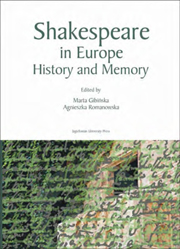Book contents
- Frontmatter
- Contents
- Preface
- Towards a European History of Henry V
- History and Histories
- History and Memory: Criticism and Reception
- History, Memory, and Ideological Appropriation
- Theatre: The Act of Memory and History in the Making
- Shakespeare Remembered by his Stuart Successors: Reflections on the 2005 “Gunpowder Season” at the Swan Theatre in Stratford
- “Who's there?” – Macbeth on the London Stage 2004–2005
- Stillness in Hamlet
- “Blood Sprinkled or Blood Spilt:” the History of Richard II Revisited in the Contemporary Theatre
- The Memory of Architecture: New Thoughts on Reconstructing old Theatres (The Case of the Gdańsk Fencing School)
- Index of Authors
“Blood Sprinkled or Blood Spilt:” the History of Richard II Revisited in the Contemporary Theatre
from Theatre: The Act of Memory and History in the Making
Published online by Cambridge University Press: 05 September 2014
- Frontmatter
- Contents
- Preface
- Towards a European History of Henry V
- History and Histories
- History and Memory: Criticism and Reception
- History, Memory, and Ideological Appropriation
- Theatre: The Act of Memory and History in the Making
- Shakespeare Remembered by his Stuart Successors: Reflections on the 2005 “Gunpowder Season” at the Swan Theatre in Stratford
- “Who's there?” – Macbeth on the London Stage 2004–2005
- Stillness in Hamlet
- “Blood Sprinkled or Blood Spilt:” the History of Richard II Revisited in the Contemporary Theatre
- The Memory of Architecture: New Thoughts on Reconstructing old Theatres (The Case of the Gdańsk Fencing School)
- Index of Authors
Summary
Whereas Shakespeare's chronicles could be regarded as a characteristic expression of the ideological concerns of his own times, their contemporary theatrical reproductions constitute at best a marginal dimension of the “engaged,” living theatre. Politically oriented versions of Richard III or Henry V, though important exceptions to this rule, do not change the overall impression. The question “What do Shakespeare's histories mean for us today?,” together with its indispensable alternative: “What do we mean by Shakespeare (or, for that matter: by Shakespeare's history)?” still seems to elicit radically different answers from textual scholars and theatre people. The issue at stake, however, is less often the impossibility of reconciling our present concerns with those of the plays, but rather our stubborn resistance to see through the veil which some contemporary readings and/or performances draw over Shakespeare's concern with the idols of envy and violence, which we simply refuse to recognise as our idols. Therefore, we feel fully entitled to dismiss them as “our” concerns, and we conveniently place the motifs of bloody sacrifice, envious rivalry and violent revenge among the “residual,” archaic, only remotely interesting aspects of Shakespearean drama.
The fortunes of tragedy
We are willing to discuss Shakespeare's politics of desire, his subtle intuitions concerning the traps of theatrical representation, his political acumen. But, as René Girard has pointed out, there is more to Shakespeare's theatre than catches the eye. The French anthropologist finds in Shakespeare's plays “things hidden from the foundation of the world,” as the biblical phrase goes.
- Type
- Chapter
- Information
- Shakespeare in EuropeHistory and Memory, pp. 303 - 312Publisher: Jagiellonian University PressPrint publication year: 2008



